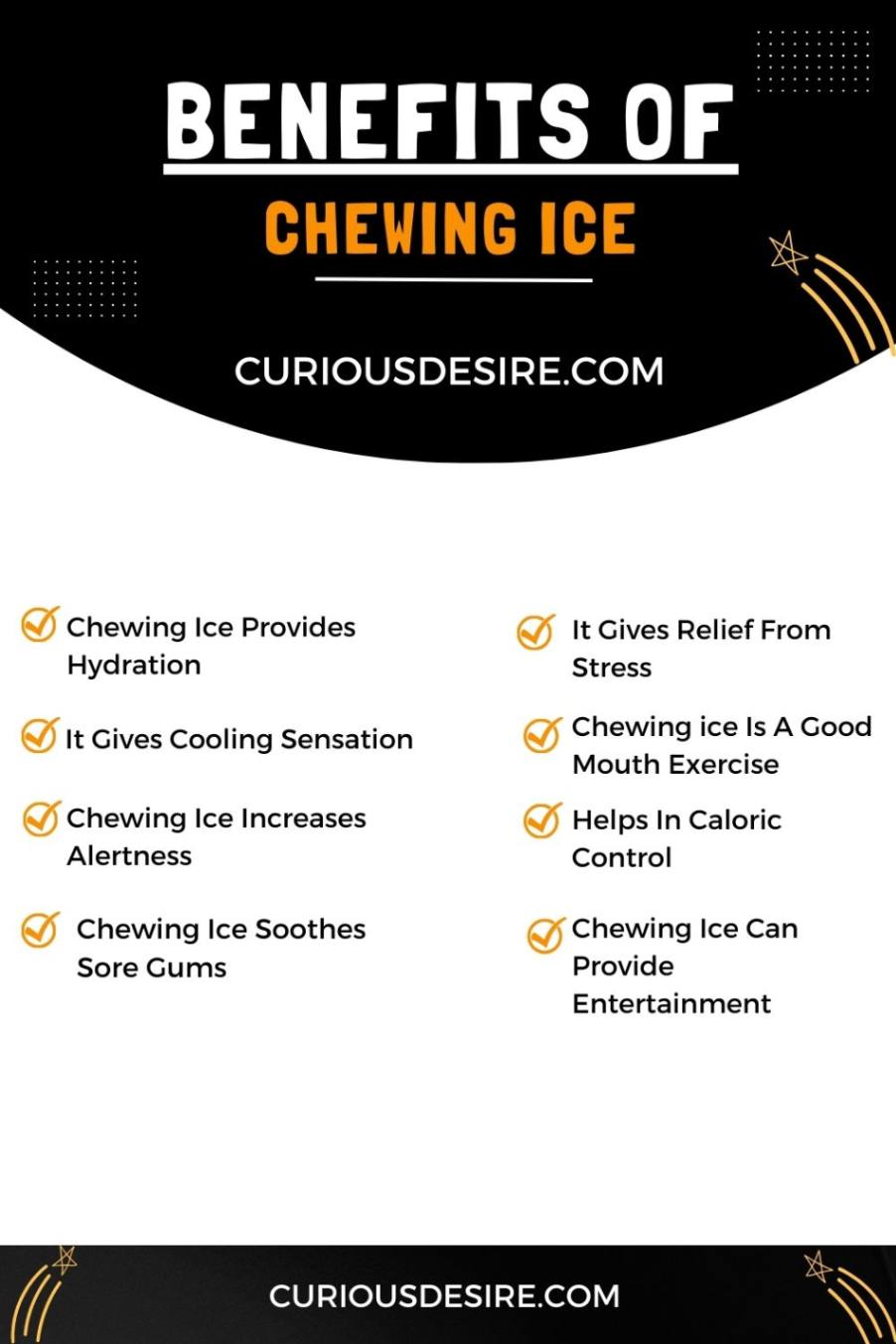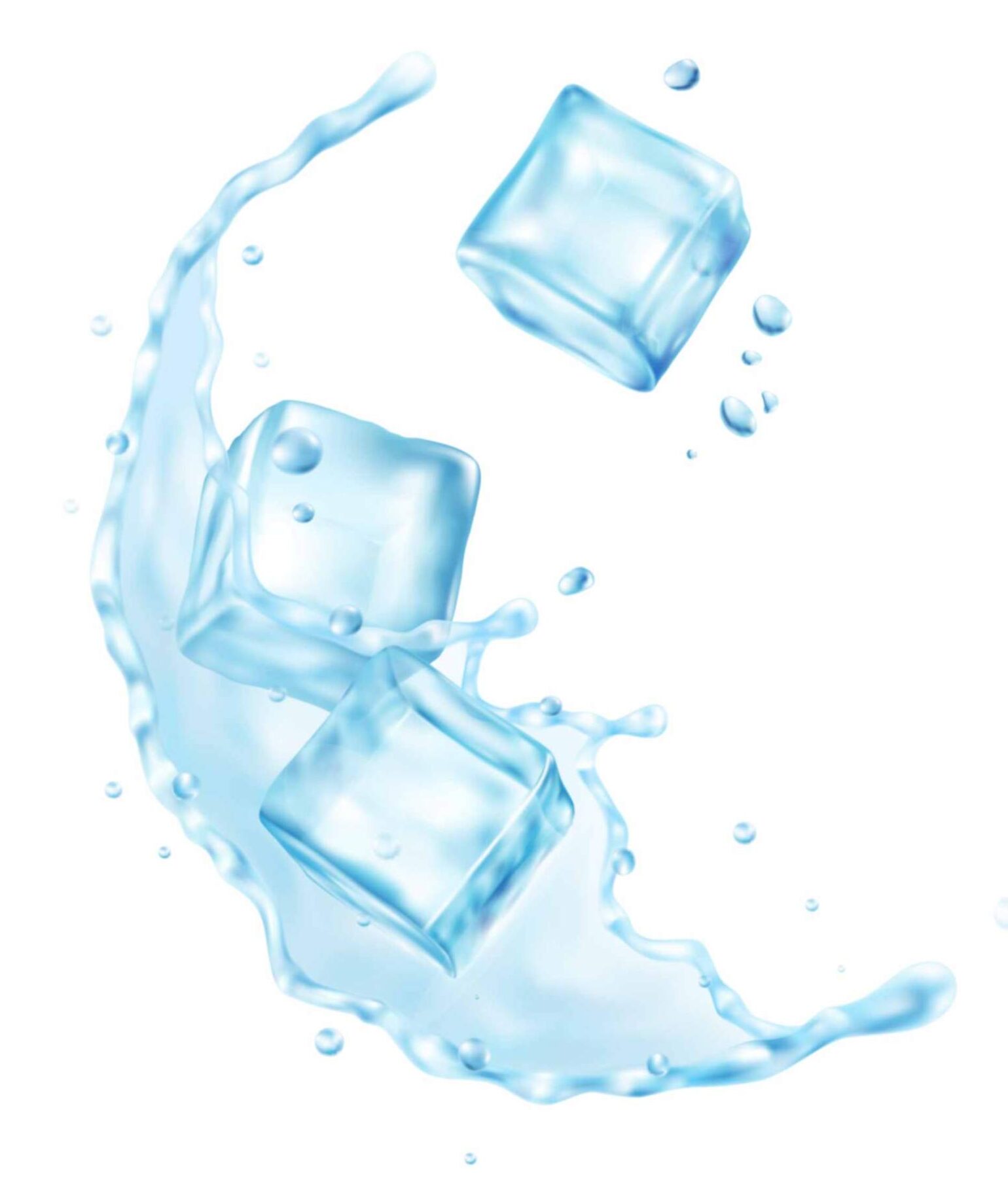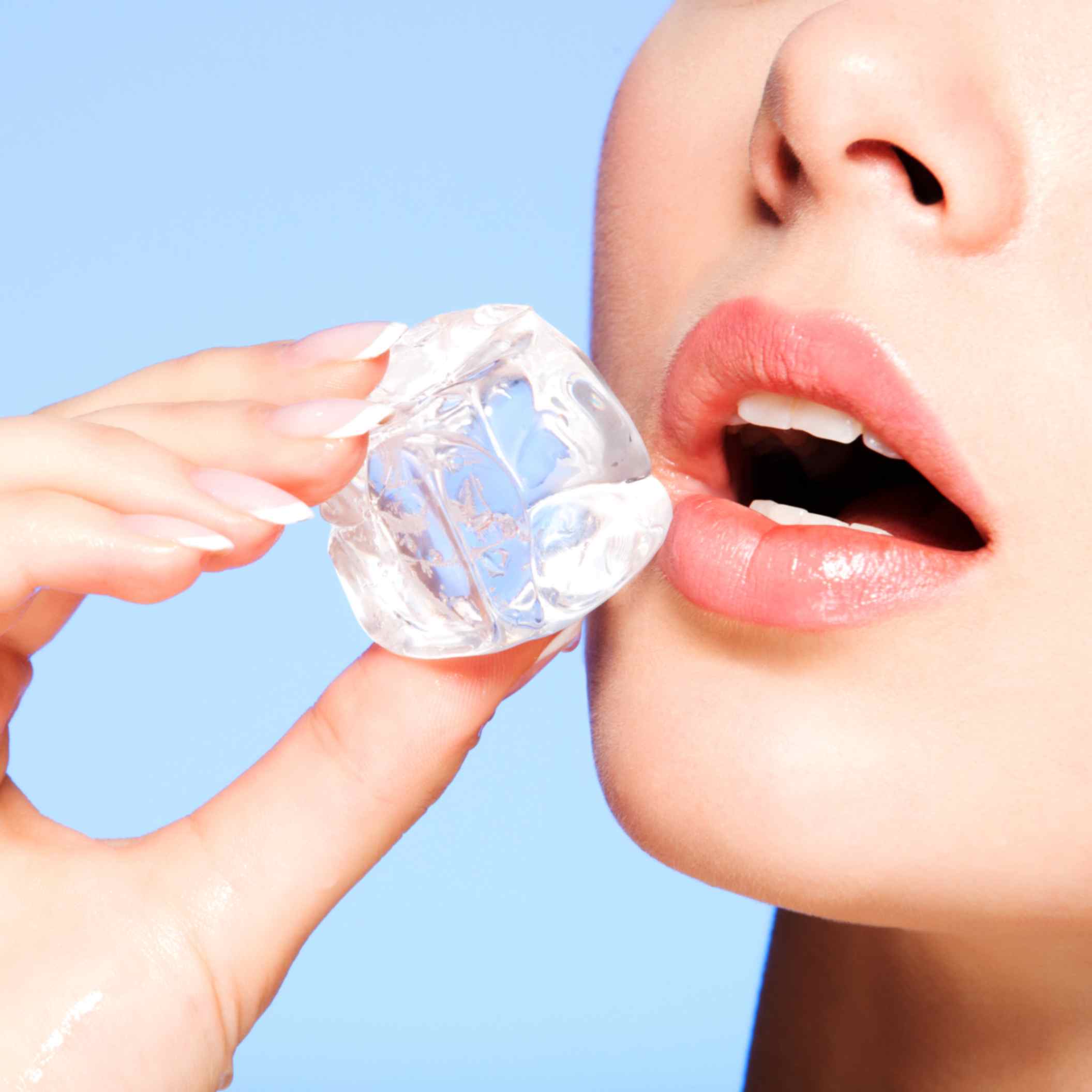Are you someone who enjoys the satisfying crunch of chewing ice? If so, you may be pleased to discover that there are potential benefits of chewing ice.
Chewing ice, or pagophagia, is the habit of compulsive craving and eating ice and it goes beyond being just a refreshing way to cool down on a hot day – it can also have a range of positive effects on your health and well-being.
By the end of this blog, you’ll have a newfound appreciation for this simple yet surprisingly beneficial practice.
5 Most Common Benefits of Chewing Ice
- Hydration
- Caloric Control
- Improves Alertness
- Soothes Sore Gums
- Stress Relief

Benefit 1: Hydration
Ah, the age-old practice of chewing ice! Not only does it provide a cooling sensation and a bit of a crunch, but it can contribute to hydration in a rather refreshing manner.
When you chew ice, it melts in your mouth and provides a momentary surge of liquid. While it’s true that this shouldn’t be considered a replacement for proper hydration (like sipping on a tall glass of water), it can certainly contribute in a small way.
It offers a quirky and enjoyable way to add a small amount of liquid refreshment to your day. Water is the true champion when it comes to quenching thirst and maintaining proper hydration levels in the body.

Benefit 2: Stress Relief
Many people find the act of chewing ice to be soothing and comforting, particularly during times of stress or anxiety. Research shows that the crunching sensation and the cold temperatures provide sensory stimulation that may help alleviate tension or unease.
The physical act of chewing can sometimes be associated with tension release. The rhythmic jaw movement might offer a way to release pent-up stress or nervous energy. When stress knocks, answer with an ice-cold crunch.
It’s important to highlight that while chewing ice might provide momentary relief for some individuals, it’s not a recommended or healthy long-term coping mechanism.
Benefit 3: Mouth Exercise
Chewing ice as a mouth exercise may offer several potential benefits such as improving jaw strength, promoting oral health, and aiding in stress relief.
The act of chewing firm substances, such as ice, provides a workout for the muscles in the jaw, promoting increased strength and endurance. This can be particularly beneficial for people who may have temporomandibular joint (TMJ) issues or who are looking to enhance their overall jaw strength.
In addition to enhancing jaw strength, chewing ice can also have potential benefits for oral health.
Research states that the cold temperature of the ice can help numb the gums, providing temporary relief for gum inflammation or oral discomfort. Furthermore, the act of chewing ice may increase saliva production, which can contribute to the removal of food particles and bacteria from the mouth, thus helping in maintaining good oral hygiene.
It is one of the most popular benefits of chewing ice. However, you should be mindful of the potential risks, including dental damage and muscle strain.

Benefit 4: Cooling Sensation
Chewing ice can provide a cooling sensation that is often desired, particularly in hot weather or after physical exertion.
The act of chewing ice can help to lower the temperature of your oral cavity, which in turn can help to cool down your body. The cold sensation of the ice can provide temporary relief from heat, especially when the weather is warm or if you have been engaging in physical activity. This can be particularly refreshing and invigorating, providing a break from the discomfort of feeling overheated.
When the temperature gets warm, chewing ice can be your ticket to a temporary polar paradise.
Moreover, the act of chewing itself can stimulate saliva production, which helps to keep the mouth moist and can provide relief from dryness or thirst.
Benefit 5: Increases Alertness
Similar to chewing gum, the act of chewing ice could potentially stimulate the trigeminal nerve, which sends signals to the brain and may contribute to increased alertness.
Some research suggests that there is a link between temperature and alertness. Chewing ice, which involves consuming something extremely cold, has a stimulating effect on the nervous system.
Chewing ice involves the consumption of small amounts of water as the ice melts in the mouth. Staying hydrated is essential for maintaining overall alertness, so the act of chewing ice and taking in small amounts of water may contribute to a more alert state.
Benefit 6: Caloric Control
Ice is often considered a low-calorie food or, more accurately, a non-caloric substance. Chewing ice can be seen as a way to occupy the mouth and provide a sensory experience without consuming excess calories. For those who struggle with overeating or snack on high-calorie foods, chewing ice can be viewed as a way to cut down your calorie intake and prevent weight gain.
Chewing ice may also provide a sense of fullness due to the oral stimulation it offers. Many people find that the act of chewing, whether it’s food or non-food items like ice, can help satisfy their need for oral stimulation, which in turn can reduce the desire to consume calorie-dense foods.
Chewing ice can serve as a substitute for higher-calorie snacks.
Source: TheHealthNerd YT Channel
Benefit 7: Soothes Sore Gums
Chewing ice is often considered to have a soothing effect on sore gums for several reasons.
- Soothing Effect: The act of chewing ice can generate a numbing or cooling sensation in the mouth, which may offer temporary relief to sore or inflamed gums. The cold temperature of the ice can help alleviate discomfort and reduce inflammation in the gum tissue.
- Oral Stimulation: Chewing ice also provides oral stimulation, which can help distract from the discomfort in the gums.
- Reduction of Swelling: The cold temperature of the ice can help constrict blood vessels in the gums, leading to a reduction in swelling and inflammation.
- Pain Distraction: Chewing ice may serve as a form of pain distraction. By engaging in the act of chewing, people may experience a reduction in their perception of gum discomfort.
It’s important to note that while chewing ice may offer temporary relief for sore gums, it is not a substitute for addressing the underlying causes of gum pain and inflammation. If you are experiencing persistent gum soreness, please seek professional dental care to determine the root cause and receive appropriate treatment.
Benefit 8: Entertainment
Chewing ice can be a cool and crunchy delight in every bite!
It can also provide a unique form of entertainment. The act of crunching on ice has a satisfying and playful quality. One of the immediate appeals of chewing ice for entertainment lies in its sensory experience. The crunchy texture and cold sensation can provide a delightful feeling, engaging multiple senses and adding an element of excitement to the act.
Additionally, the act of chewing ice has been known to serve as a helpful way to cool down and refresh oneself, particularly during hot weather or in environments where the air is dry or stuffy.
Including the act of chewing ice into daily routines can infuse moments with a sense of joy and playfulness, turning a simple frozen treat into a source of lighthearted entertainment that can elevate one’s mood and outlook.
Conclusion
The benefits of chewing ice are surprisingly diverse and can have a positive impact on various aspects of your health and daily life. From its potential to alleviate stress and enhance concentration to its effects on metabolism and dental health, the act of chewing ice may offer more advantages than many people realize.
Life’s too short not to savor every refreshing moment, right?
Chewing Ice Benefits FAQs
1. Is chewing ice good for you?
Chewing ice can provide benefits such as stress relief, improved focus, and potential hydration, but it’s important to do so in moderation to avoid adverse effects on dental health.
2. Does chewing ice help with hydration?
Yes, hydration is one of the most common benefits of hydration. While chewing ice can provide some degree of hydration, it’s not a substitute for consuming adequate amounts of water. However, it can be a refreshing way to stay hydrated, especially in hot weather.
3. Can chewing ice improve concentration and focus?
Some individuals find that the sensory experience of chewing ice can help promote alertness and enhance concentration, potentially contributing to improved focus.
4. Can chewing ice help control appetite?
Some individuals claim that chewing ice can help temporarily suppress appetite by providing a sensory distraction. However, it’s important to remember that chewing ice should not be used as a weight control measure and is not a substitute for a balanced diet.
5. Who should avoid chewing ice?
Although there are several benefits of chewing ice people with dental sensitivities, dental work, iron deficiency anemia, TMJ disorders, or certain medical conditions should approach ice chewing with caution and seek guidance from a healthcare professional to determine whether it is suitable for them.
6. How can I chew ice safely?
To chew ice safely, it’s important to avoid biting down forcefully and to use small, crushed ice rather than large, solid cubes. Additionally, keeping the ice toward the front of the mouth can help minimize the risk of dental damage.
7. Can chewing ice boost metabolism?
Some individuals believe that the cold temperature of ice may stimulate the metabolism, potentially leading to a slight increase in calorie expenditure. However, more research is needed to understand this potential benefit fully.